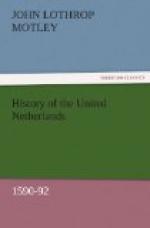The regular army of the republic, as reconstructed, was but ten thousand foot and two thousand horse, but it was capable of being largely expanded by the trainbands of the cities, well disciplined and enured to hardship, and by the levies of German reiters and other, foreign auxiliaries in such numbers as could be paid for by the hard-pressed exchequer of the provinces.
To the state-council, according to its original constitution, belonged the levying and disbanding of troops, the conferring of military offices, and the supervision of military operations by sea and land. It was its duty to see that all officers made oath of allegiance to the United Provinces.
The course of Leicester’s administration, and especially the fatal treason of Stanley and of York, made it seem important for the true lovers of their country to wrest from the state-council, where the English had two seats, all political and military power. And this, as has been seen, was practically but illegally accomplished. The silent revolution by which at this epoch all the main attributes of government passed into the hands of the States-General-acting as a league of sovereignties—has already been indicated. The period during which the council exercised functions conferred on it by the States-General themselves was brief and evanescent. The jealousy of the separate provinces soon prevented the state-council—a supreme executive body entrusted with the general defence of the commonwealth—from causing troops to pass into or out of one province or another without a patent from his Excellency the Prince, not as chief of the whole army, but as governor and captain-general of Holland, or Gelderland, or Utrecht, as the case might be.
The highest military office in the Netherlands was that of captain-general or supreme commander. This quality was from earliest times united to that of stadholder, who stood, as his title implied, in the place of the reigning sovereign, whether count, duke, king, or emperor. After the foundation of the Republic this dynastic form, like many others, remained, and thus Prince Maurice was at first only captain-general of Holland and Zeeland, and subsequently of Gelderland, Utrecht, and Overyssel, after he had been appointed stadholder of those three provinces in 1590 on the death of Count Nieuwenaar. However much in reality he was general-in-chief of the army, he never in all his life held the appointment of captain-general of the Union.
To obtain a captain’s commission in the army, it was necessary to have served four years, while three years’ service was the necessary preliminary to the post of lieutenant or ensign. Three candidates were presented by the province for each office, from whom the stadholder appointed one.—The commissions, except those of the highest commanders, were made out in the name of the States-General, by advice and consent of the council of state. The oath of allegiance, exacted from soldiers as well




